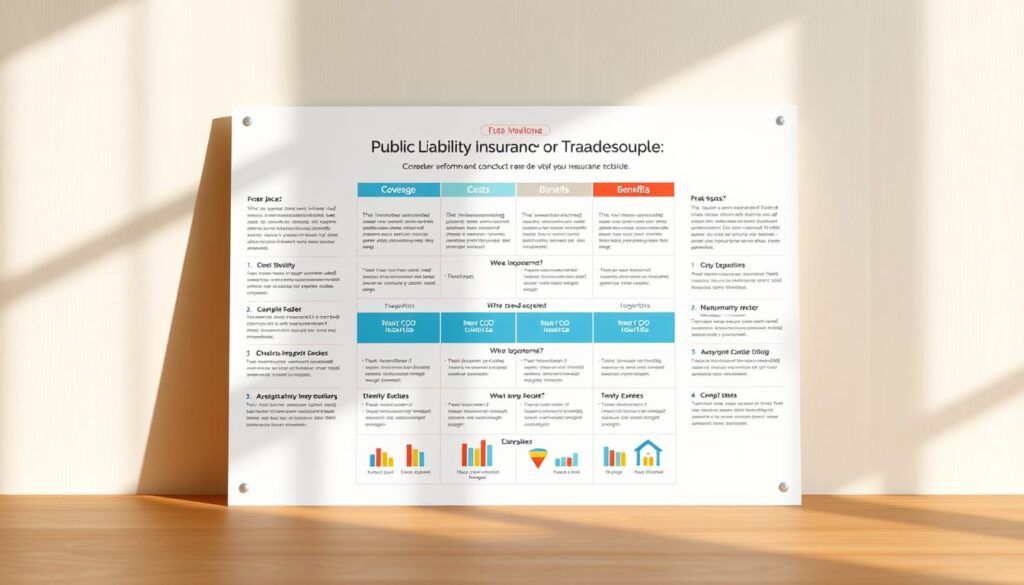As a tradesperson operating in the UK, you’re likely no stranger to the risks associated with your line of work. Accidents can happen, and when they do, the financial implications can be severe. This is where liability insurance comes into play, providing a safeguard against potential claims from third parties.
Having the right business cover in place not only protects your financial stability but also enhances your credibility with clients. It’s essential to understand the importance of this insurance and how to secure it.
Key Takeaways
- Understand the role of liability insurance in protecting your trade business.
- Learn about the straightforward process of registering for this essential cover.
- Discover how it safeguards your business against compensation claims and legal expenses.
- Find out why it’s considered crucial for tradespeople, despite not being a legal requirement.
- Explore how proper insurance coverage boosts your business credibility.
Understanding Public Liability Insurance for Tradespeople

If you’re a tradesperson, understanding public liability insurance can be the difference between financial security and potential bankruptcy. Public liability insurance, sometimes referred to as general liability insurance, “PL” or “PLI”, is a type of business insurance that protects you if a third party makes a claim against you due to accidental injury or property damage related to your business activities.
With public liability insurance, you’ll be covered against the cost of legal fees, compensation claims, and repairing or replacing damaged property. This type of insurance is particularly important for tradespeople who work in clients’ homes, commercial properties, and public spaces where accidents can occur despite taking necessary precautions.
What Public Liability Insurance Covers
Public liability insurance provides essential financial protection if a customer or member of the public suffers injury or property damage due to your business activities. The coverage includes compensation payments of up to £10 million for damages, medical bills, or lost earnings resulting from accidents related to your trade work. Additionally, legal costs of up to £1 million are typically covered for claims of accidental bodily injury, property damage, or other liabilities connected to your business operations.
It’s equally important to understand what is not covered. Personal injuries to yourself, employee claims, and damage to your own property and equipment are typically excluded from public liability policies.
Why Tradespeople Need This Protection
Tradespeople need public liability insurance because a single claim could potentially bankrupt an uninsured business, with legal fees and compensation potentially running into thousands of pounds. This insurance is crucial for protecting your business’s financial stability and reputation.
By having public liability insurance, you can work with peace of mind, knowing that you’re protected against unforeseen accidents and financial losses. This not only benefits your business but also enhances your credibility with clients who often require proof of insurance before hiring tradespeople.
The Benefits of Registering for Public Liability Insurance
Public liability insurance is not just a legal precaution; it’s a vital tool for tradespeople to ensure financial security and peace of mind. While it’s not a legal requirement, having this insurance can protect your business from unforeseen costs associated with accidents or damages during your work. Many clients and local authorities may request proof of public liability insurance as part of their business agreement, making it a crucial aspect of your business operations.
Financial Protection Against Claims
Registering for public liability insurance provides crucial financial protection against potentially devastating claims that could drain your business resources. For a relatively small monthly premium, you gain protection against claims that could potentially cost tens or hundreds of thousands of pounds. This financial safeguard allows you to operate your business with confidence, knowing you’re protected against unforeseen events.
Enhanced Business Credibility
Having proper insurance coverage enhances your professional image and demonstrates to potential clients that you operate a responsible, legitimate business that takes risk management seriously. Many clients and contractors will require proof of public liability insurance before allowing you to commence work, making it essential for securing new business opportunities. Public liability insurance can be a significant selling point when marketing your services, as customers often prefer to hire tradespeople who have comprehensive insurance coverage in place.
Peace of Mind While Working
The peace of mind that comes with knowing you’re protected allows you to focus on delivering quality workmanship rather than worrying about potential accidents or claims. This not only improves your work quality but also enhances your overall business reputation. By registering for public liability insurance, you can ensure that your business activities are covered, providing you with the freedom to concentrate on your trade without undue stress.
How to Register for Public Liability Insurance Tradesperson

As a tradesperson, obtaining public liability insurance is easier than you think with our streamlined online registration process. This process is designed to be user-friendly, allowing you to complete the application in just a few minutes. With our straightforward quote process, you’ll receive a quote tailored to your business needs within minutes.
Online Registration Process
The registration process for public liability insurance has been streamlined by most providers, enabling tradespeople to complete the entire application online quickly. You’ll need to provide basic information about your business, including your trade, number of employees, annual turnover, and the specific types of work you undertake. Most insurers will also ask about your claims history, so be prepared to disclose any previous insurance claims you’ve made in the past five years.
After submitting your application and payment, you’ll typically receive your policy documents immediately via email, allowing you to provide proof of insurance to clients straight away. Many insurers offer flexible payment options, enabling you to pay monthly or annually, depending on what works best for your business cash flow.
Required Documentation
To complete the registration process, you’ll need to provide certain documentation. This typically includes proof of your business registration, qualifications or certifications relevant to your trade, and sometimes evidence of your business address. Ensuring you have these documents ready will help streamline the application process.
By following these steps and providing the necessary information, you can quickly and easily register for public liability insurance as a tradesperson. This will not only protect your business but also enhance your credibility with clients.
Choosing the Right Level of Cover for Your Trade
The level of public liability cover you need depends on various factors related to your trade and business operations. “Getting the right level of insurance is crucial for protecting your business from potential financial risks,” as emphasized by industry experts. Your public liability insurance should be tailored to your specific business needs, taking into account several key considerations.
Standard Coverage Options (£1M to £10M)
Standard public liability insurance coverage options typically range from £1 million to £10 million. The appropriate level for your business depends on your specific trade and circumstances. For instance, high-risk trades such as scaffolding or electrical work may require higher coverage limits compared to lower-risk activities. It’s essential to assess your business risks carefully to determine the most suitable level of cover.
Factors That Determine Your Coverage Needs
Several factors influence the level of public liability insurance your business requires. These include:
- The size of your business: Larger operations with more employees and higher turnover generally require higher levels of protection.
- Your specific trade: High-risk trades typically necessitate higher coverage limits.
- Client requirements: Many commercial contracts and public sector work specify minimum coverage levels, often £5 million or £10 million.
- Industry body standards: Trade associations frequently set recommended or required insurance levels for their members.
- Risk appetite: Consider the typical value of the properties you work in and your risk tolerance.
By carefully evaluating these factors, you can determine the most appropriate level of public liability insurance for your trade business, ensuring a balance between adequate protection and cost-effectiveness.
Public Liability Insurance Costs for UK Tradespeople

As a tradesperson in the UK, it’s essential to comprehend the factors that influence the cost of your public liability insurance. The premiums you pay can significantly impact your business’s bottom line, making it crucial to understand what affects these costs.
Average Premium Rates
Public liability insurance premiums for UK tradespeople typically start from around £5 per month. However, costs can vary significantly based on several key factors, including your specific trade, the size of your business, and your claims history.
For instance, high-risk trades like roofing or electrical work command higher premiums compared to lower-risk activities such as decorating or gardening. Additionally, businesses with multiple employees or higher annual turnover generally pay more than sole traders.
Factors Affecting Your Premium
Several factors determine your public liability insurance premium. Your occupation plays a significant role, as trades involving dangerous machinery or equipment are considered higher risk. The location where you operate also affects your premium, with businesses in areas of heavy footfall or densely populated urban environments sometimes facing higher costs.
Furthermore, the number of staff you employ impacts your premium, as more employees increase the likelihood of claims. The level of cover you choose also directly affects your premium, with higher coverage limits (£5-10 million) costing more than basic £1 million policies.
To get the best rate, it’s advisable to shop around and compare quotes from multiple providers. Most insurers offer flexible payment options, allowing you to spread the cost monthly or pay annually, with annual payments often providing a small discount.
Comparing Public Liability with Other Insurance Types
Understanding the nuances between different insurance types is crucial for tradespeople to ensure comprehensive protection. As a tradesperson, you need to be aware of the various insurance options available to protect your business adequately.
Public Liability vs. Employers’ Liability
The main difference between public liability and employers’ liability is who is covered by these two types of insurance. Public liability insurance covers claims from third parties, such as customers and the general public, protecting against accidental injury or property damage. In contrast, employers’ liability insurance protects employees who have been accidentally injured or fallen ill because of working for you. It’s a legal requirement for any business with employees.
| Insurance Type | Covers | Legal Requirement |
|---|---|---|
| Public Liability | Third-party claims for injury or property damage | No, but often contractually required |
| Employers’ Liability | Employee claims for injury or illness | Yes, for businesses with employees |
Public Liability vs. Professional Indemnity
The difference between public liability and professional indemnity lies in the type of situation you’re covered for. Public liability insurance covers accidental injuries to others and damage to third-party property. Professional indemnity insurance, on the other hand, covers financial losses resulting from professional advice or services.

By understanding these differences, you can ensure your trade business has the right insurance coverage, protecting you against various risks without unnecessary overlap.
Trade-Specific Insurance Considerations
Tradespeople across different industries face a range of risks that necessitate tailored public liability insurance solutions. As a tradesperson, understanding the specific insurance needs of your trade is crucial for maintaining adequate protection against potential risks.
Coverage for Builders and Construction Trades
Builders and those in construction trades typically require higher coverage limits, often between £5-10 million, due to the high-risk nature of their work. This includes potential risks such as significant property damage or serious injuries on site. Public liability insurance for builders should cover risks like scaffolding accidents, material damage, and site injuries.
Coverage for Electrical and Plumbing Trades
For electrical and plumbing trades, specialized coverage is necessary to address risks such as water damage, fire hazards, and potential long-term consequences of faulty installations. Liability insurance for these trades should include protection against claims arising from electrical fires or water leaks caused by improper workmanship.
Coverage for Decorators and Property Maintenance
Decorators and property maintenance professionals need coverage that specifically addresses accidental damage to clients’ possessions, fixtures, and fittings during routine work. This includes protection against damages caused by painting, decorating, or maintenance activities.
| Trade Type | Typical Risks | Recommended Coverage |
|---|---|---|
| Builders and Construction | Scaffolding accidents, material damage, site injuries | £5-10 million |
| Electrical and Plumbing | Water damage, fire hazards, faulty installations | £2-5 million |
| Decorators and Property Maintenance | Accidental damage to client’s possessions, fixtures, and fittings | £1-2 million |
When selecting public liability insurance, it’s essential to consider the specific risks associated with your trade and choose a policy that provides adequate coverage. Additionally, factors such as height and depth limits, specialist tools and equipment coverage, and trade-specific exclusions should be carefully reviewed to ensure your business activities are fully protected against third-party claims.
Common Claims Scenarios for Tradespeople
Understanding common claims scenarios is crucial for tradespeople to appreciate the importance of public liability insurance. As a tradesperson, you are exposed to various risks that can lead to costly claims, potentially jeopardizing your business.
Property Damage Claims
Property damage claims are a frequent occurrence in the trades industry. These can arise from accidental damage to clients’ homes or possessions during work. For instance, a plumber might cause water damage, or a painter might spill paint on expensive furnishings. Structural damage claims can be particularly costly, such as when a tradesperson accidentally damages load-bearing walls or causes issues with property foundations.
- Builders might face claims if someone trips over their tools.
- Hairdressers could be liable if they accidentally cut a client.
- Gardeners may face claims if someone trips over a hole they’ve dug.
Injury Claims from Customers and Public
Injury claims often result from members of the public tripping over tools or materials, or being struck by falling objects at work sites. Customer injury claims might also arise from incomplete work creating hazards, such as exposed wiring or unfinished flooring causing trips or falls. Even the most careful tradespeople can face claims, as accidents can happen despite following best practices and safety protocols.
- Bakers might be held liable if their custom cakes cause illness.
- Cleaners could face claims if their work results in damage to a customer’s property, such as staining a couch.
- Dog walkers may be liable if a dog in their care gets injured.
Real-world claim examples demonstrate that the cost of settlements often far exceeds the annual premium for comprehensive liability insurance coverage. Therefore, having adequate public liability insurance is essential for protecting your business against such unforeseen events.
Additional Coverage Options to Consider
To build a robust insurance portfolio, tradespeople should consider various coverage options beyond basic public liability insurance. While it provides essential protection, there are other critical insurance types that can safeguard your trade business comprehensively.
Tools and Equipment Insurance
Tools and equipment insurance is vital for tradespeople who rely on expensive tools to perform their work. This insurance covers theft, damage, or loss of these essential business assets. Many insurers offer specific coverage for both owned tools and hired equipment, ensuring you’re protected regardless of whether you own or rent the tools you use. For instance, you can opt for ‘own plant tools and equipment’ cover for tools you own, or ‘hired-in plant tools and equipment’ cover for tools you’ve hired to complete a job.
Legal Expenses Cover
Legal expenses cover provides access to expert legal advice and covers the cost of legal representation in disputes, even for matters not directly related to public liability claims. This cover is particularly useful as it helps you navigate complex legal issues that may arise during your business operations, providing financial protection against legal costs.
Other coverage options to consider include product liability insurance, which covers claims arising from products you’ve supplied, manufactured, or installed, and business interruption insurance, which provides crucial financial support if you’re unable to work due to an insured event. Additionally, personal accident insurance offers financial protection if you’re injured and unable to work, providing income replacement that public liability doesn’t cover.
The Registration and Claims Process
Understanding the registration and claims process for public liability insurance is crucial for tradespeople to protect their business. The process has been designed to be straightforward and user-friendly.
Step-by-Step Registration Guide
To register for public liability insurance, gather essential information about your business, including your trade details, number of employees, annual turnover, and business address. Most insurers offer online quote systems where you can enter your details and receive an immediate price indication. Once you’ve selected a policy, you’ll need to confirm your details, answer risk assessment questions, and provide payment information.
After registration, you’ll receive your policy documents immediately via email, with hard copies sometimes following by post. As Quote: “Having the right insurance in place can make all the difference when it comes to protecting your business.”
How to Make a Claim
In the event of a potential claim, notify your insurer as soon as possible. Most policies require notification within 30 days of becoming aware of an incident. When making a claim, provide details of the incident, any property damage or injuries involved, and supporting documentation such as photographs or witness statements.
Your insurer will assign a claims handler to guide you through the process. They may arrange for assessors to evaluate damage or legal representatives to handle any litigation. By understanding the registration and claims process, you can ensure your business is protected with the right public liability insurance.
Legal Requirements and Contractual Obligations
While public liability insurance isn’t legally mandatory, it is often effectively required through contractual obligations and industry standards. As a tradesperson in the UK, understanding both the legal requirements and contractual obligations regarding public liability insurance is crucial for operating a compliant and professional business.
When Insurance Is Legally Required
Although public liability insurance is not a legal requirement, there are instances where having insurance is mandatory. For example, employers’ liability insurance is legally required for any business with employees, with potential fines of up to £2,500 per day for non-compliance. This distinction highlights the importance of understanding the different types of insurance and their legal implications.
Client and Contract Requirements
Many clients, particularly commercial and public sector organisations, specify minimum public liability coverage levels (typically £5-10 million) in their contract terms. Additionally, trade associations and professional bodies often require members to maintain adequate liability insurance as a condition of membership. Other entities that may require proof of public liability insurance include:
- Commercial landlords before allowing tenants to operate from their premises
- Event organisers, markets, and exhibition venues before allowing tradespeople to participate
- Local authorities before granting certain licenses or permissions for business activities
The table below summarises the key contractual obligations that may require public liability insurance:
| Entity | Requirement |
|---|---|
| Commercial Clients | Minimum £5-10 million coverage |
| Trade Associations | Adequate liability insurance for membership |
| Event Organisers | Proof of public liability insurance before participation |
As illustrated, while there isn’t a legal requirement for public liability insurance, the contractual obligations effectively make it a necessity for many tradespeople. Ensuring you have the appropriate level of cover is essential for securing contracts and maintaining a professional reputation.
Tips for Getting the Best Insurance Deal

Tradespeople can significantly benefit from knowing how to navigate the insurance market to get the best deal on their public liability insurance. Securing the best deal requires research and understanding of how insurers calculate premiums for tradespeople.
Comparing Providers and Policies
To find the best public liability insurance, compare multiple providers using both online comparison tools and direct quotes. Ensure you’re comparing equivalent levels of cover rather than just focusing on price. Consider specialist trade insurers who understand your industry, as they often provide more appropriate coverage and competitive rates than general business insurers.
Discounts and Ways to Save
Bundling multiple insurance types (public liability, tools, van insurance) with one provider often results in significant discounts compared to purchasing separate policies. Many insurers offer no-claims discounts, so highlighting a clean claims history can help reduce your premium costs. Paying annually rather than monthly typically results in savings of 5-10% on your overall premium.
Some trade associations and professional bodies negotiate member discounts with specific insurers, potentially offering substantial savings. Be accurate but strategic when describing your business activities – unnecessarily including high-risk activities you rarely perform can increase premiums. Review your coverage annually to ensure it still matches your business needs, adjusting coverage levels as your business grows or changes.
Case Studies: How Public Liability Insurance Protected Tradespeople
The importance of public liability insurance for tradespeople cannot be overstated, as real-world case studies demonstrate. Tradespeople often face unforeseen risks that can lead to significant financial claims.
For instance, a plumber accidentally damaged a water pipe while installing a new bathroom, causing extensive flooding. The public liability insurance covered £18,000 in property repairs and alternative accommodation costs. Similarly, an electrician’s work caused a small electrical fire in a commercial property, resulting in business interruption. The liability insurance covered £45,000 in property damage and loss of earnings claims.

Other examples include a builder whose tools were tripped over by a member of the public, resulting in a £12,000 compensation claim covered by their public liability insurance. A painter who accidentally spilled paint on a client’s antique furniture had the full restoration costs covered by their insurance.
These case studies highlight the crucial protection that public liability insurance provides to tradespeople facing potentially devastating claims, safeguarding their business and financial stability.
Conclusion: Securing Your Trade Business with the Right Insurance
Ensuring the longevity of your trade business involves making informed decisions about public liability insurance coverage. Registering for this type of insurance is a fundamental step in protecting your business from potentially devastating financial claims. By selecting the right level of cover based on your specific trade, business size, and client requirements, you can ensure you’re neither underinsured nor paying for unnecessary coverage.
The relatively small cost of comprehensive liability insurance provides invaluable peace of mind, allowing you to focus on delivering quality workmanship. Moreover, having the right insurance in place enhances your professional credibility and helps you secure more contracts. Regular reviews of your insurance needs as your business grows or changes will ensure your protection remains adequate throughout your business journey.
With the right public liability insurance in place, you can confidently grow your trade business knowing you’re protected against the unexpected, covering all your business activities.



